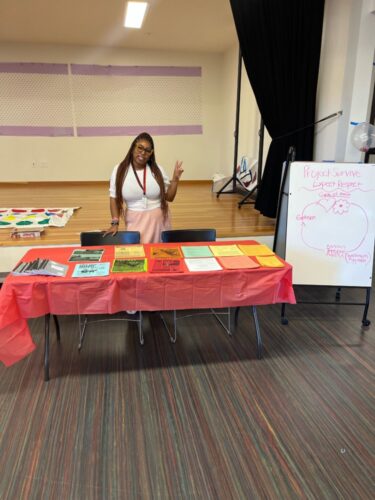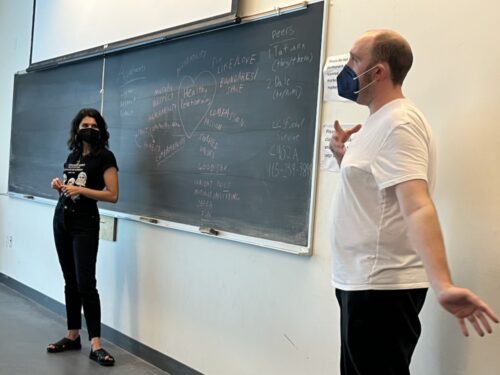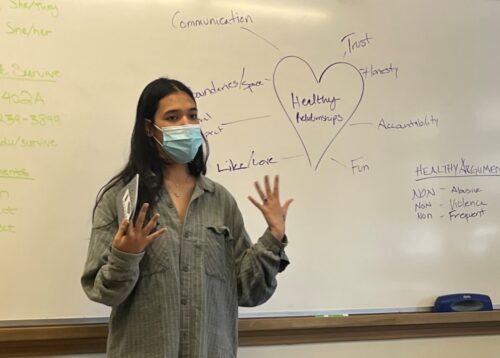Project SURVIVE Persists in Promoting Healthy Relationships and Combating Abuse Despite Pandemic Challenges
By Ann Marie Galvan
agalvan1@mail.ccsf.edu
Despite the challenges posed by the pandemic, Project SURVIVE, a peer-education program of the Women’s and Gender Studies Department, persists in providing training and employment to students by implementing a comprehensive sexual violence prevention initiative that involves presentations, events, courses, resource assistance, and on-campus job opportunities for students.
Since the COVID-19 pandemic, continuity in the student leadership pipeline has been difficult to maintain and funding support for the program has continued to decline, said Adele Failes-Carpenter, Project SURVIVE coordinator.

“Since about 2018, there’s been falling support and funding for student jobs on campus. And so that has been a challenge,” Failes-Carpenter said. “Not just for our program, but I think for many programs that are prioritizing student leadership on campus.”
Founded in 1993, Project SURVIVE aims to promote healthy relationships, empower individuals in intimate relationships, and cultivate student leadership skills to combat abuse in their communities, and in society at large. With a social justice focus, the program aims to educate and end sexual and domestic violence.
The program fights to keep student worker positions in the annual budget. “A big piece of the advocacy we’ve done over the last few years is to make sure that our college is reflecting the value of leadership and maintaining a safe and supportive campus,” said Failes-Carpenter.
Despite these challenges, Project SURVIVE has been able to stay up to date with the latest research and best practices in promoting healthy relationships, and in 2020 they released training on how people can communicate COVID risks with “loved ones, roommates, and potential partners.”
Project SURVIVE’s content is partly developed by students themselves during a retreat every spring, where they discuss potential changes to the curriculum. Employer advisory boards also advise the program’s curriculum, ensuring that it remains relevant and effective.
“It’s definitely been rewarding to be able to really give information on relationships across the spectrum, because we focus on healthy and unhealthy relationships,” said current peer educator Yubitza Bautista-Santana.

Bautista-Santana is a licensed clinical social worker with a background in mental health, and mostly presents for Project SURVIVE’s Expect Respect program. Expect Respect presents healthy relationship workshops to San Francisco public high school students.
“It’s still very surprising to see and get the students’ feedback about the information that they don’t know and what they’ve learned because of this program being in the schools,” Bautista-Santana said.
Most high school students don’t know “the warning signs of an unhealthy relationship, or the cycle of abuse. The warning signs are new information. Even things about a healthy relationship where they’re like, ‘Okay, learn more about respect, about healthy arguments.’ It’s really good feedback to know that we’re providing them with the information.”
The presentations also encourage students to put their knowledge to use. “It really prompts them to find ways to implement what they’re learning in their everyday life with other people, and we need more of that,” they said.

Ultimately, Project SURVIVE aims to empower individuals and communities to address issues of power and violence in relationships, creating a safer and more equitable society for all, and Bautista-Santana hopes that students can “use the information for self-reflection to create a new social movement, one of personal healing.” By personalizing information and working on self-healing, individuals can help undo the “emotional reactivity and force that is occurring in the different levels of society today,” they said.
“Today is a reflection of what has occurred over time from the past, but tomorrow is still unwritten, and at the end of the day, we all need each other to create the society that we are all deserving of and want to be a part of, one of mutual respect,” said Bautista-Santana.
